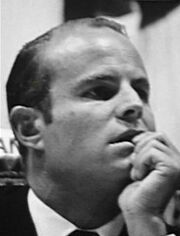


20th Century Fox - commonly abbreviated to "Fox" - was an American film studio located west of Beverly Hills in Los Angeles, California. It was the distribution studio for the original pentalogy of Planet of the Apes movies (1968-1973), a 2001 re-imagining movie and a reboot movie trilogy (2011-2017). In 2019 'The Walt Disney Company' acquired the company and re-branded it as 20th Century Studios, stating their intention to make further Planet of the Apes films.
History
The company was founded on May 31, 1935, as the result of the merger of Fox Film Corporation (founded by Hungarian immigrant William Fox in 1915, but who was ousted in 1930), and 20th Century Pictures (founded in 1933 by Darryl F. Zanuck - former head of production at Warner Bros. - with Joseph Schenck - former President of United Artists - Raymond Griffith and William Goetz). With Joe Schenck as Chairman (Chief Executive Officer), Fox's Sidney Kent as President and Zanuck as Vice-President in charge of production, 20th Century-Fox produced two Academy Award-winning films early on, The Grapes of Wrath in 1940 and How Green Was My Valley (starring Roddy McDowall) in 1941.
Zanuck left his position in 1956 to become an independent film producer, and Spyros Skouras - Fox President since 1942 - took over the day-to-day running of the studio. However, the production of Cleopatra spiralled out of control and almost bankrupted the company, and Fox was forced to sell much of its prime real-estate back lot in 1961 to raise cash - later the site of the Century City complex. In 1962 Zanuck persuaded his fellow-stockholders not to liquidate the business and returned to become President, relegating Skouras to the post of Chairman and allowing the company to begin making movies again after the disastrous Cleopatra was finally completed in 1963. That same year Darryl Zanuck made his son Vice-President in charge of production. Only 28 years old, Richard D. Zanuck began making pictures with modest budgets, producing 20 movies in 14 months. After the release of The Sound of Music in 1964, the Zanucks went on to produce more lavish, big-budget movies such as Dr. Dolittle (1967), Hello, Dolly! (1969) and Tora! Tora! Tora! (1970), with hit-and-miss results.

Richard D. Zanuck
In September 1966, Richard Zanuck green-lit production of a Planet of the Apes film by Arthur P. Jacobs and his company, APJAC International, having previously rejected it in December 1963. The first Planet of the Apes movie, released in February 1968, provided a huge, much-needed hit for Fox, still reeling from the $40 million it had spent on Cleopatra five years before. The film concluded with an iconic image of the Statue of Liberty created by veteran matte painter Emil Kosa Jr in one of his final movies; Kosa had also designed the Art Deco 'searchlight' logo for 20th Century Pictures - later altered to reflect the merger with Fox in 1935 - which remains one of the most recognisable images of the movie industry. Planet of the Apes was never intended to spawn a franchise, but the film was such a runaway hit that the studio demanded a sequel. Behind the scenes at Fox though, tensions were building. Dr. Dolittle (also produced by APJAC) and Tora! Tora! Tora! turned out to be two of the biggest box office losers in the history of Hollywood, and the company once again headed into debt. In 1969 Darryl Zanuck had stepped aside for Richard to become President of Twentieth Century-Fox, while he replaced Skouras as Chairman of the board, but he soon felt he had been too hasty and began conspiring against his son. The financial strain, as well as creative differences, sparked a proxy fight for control of the company. Beneath the Planet of the Apes was released in May of 1970. Screenwriter Paul Dehn (with the creative input of actor Charlton Heston, and the connivance of Richard Zanuck) crafted the final script to end in such a fashion as to prevent any further sequels: the movie climaxed with the destruction of the Earth.
The boardroom tensions at Fox finally erupted in December 1970 when Darryl Zanuck humiliated Richard at a board of directors meeting and forced him to resign from the company. Tiring of Zanuck Sr, the board of directors would in turn force him out in May 1971. Undeterred by the Apes apocalypse, Fox demanded another follow-up. Director Don Taylor was brought on board and managed to resurrect a few essential ape characters, while simultaneously working within an extremely truncated budget. 20th Century-Fox released Escape from the Planet of the Apes in the Spring of 1971. The sequel to Escape, Conquest of the Planet of the Apes, was primarily filmed in the newly constructed Century City Shopping Center, across from the back lot of the 20th Century-Fox studio, and once part of their property. Aware that studio executives would likely demand further film projects, director J. Lee Thompson molded the climax of Conquest to allow for further franchise development. Only one more film was given the green light after the success of Conquest, and Battle for the Planet of the Apes was released on June 15, 1973 - less than two weeks before the sudden death of Apes producer Arthur P. Jacobs. His APJAC company subsequently sold all rights and privileges of the Planet of the Apes adventures to Fox.[1]
In 1974, 20th Century-Fox's TV division produced a short-lived Planet of the Apes television series, broadcast on the CBS TV network. With the cancellation of the series in December of that year, Fox followed it with a Saturday morning animated series broadcast on NBC in 1975. During this period, an Apes merchandising blitz was launched on a scale never seen before, paving the way for the kind of campaign that is standard in today's Hollywood movie industry. Official merchandise was licensed from Fox and the vast array of products proved to be very lucrative for a brief time.
The company went through a number of fundamental changes during the 1970s and 1980s. Chairman Dennis Stanfill attempted to introduce a more responsible corporate structure which would prevent the company being controlled by dominant personalities as in the past. The studio had a number of successful films in this era - most notably Star Wars in 1977 which broke all box-office records - but managed to avoid the financial gambles that had characterized the 1960s. 20th Century-Fox stock was bought up by the family of oil tycoon Marvin Davis in 1981, and by media tycoon Rupert Murdoch in 1985. The hyphen was formally dropped from the studio name in 1984.
From 1988, studio executives of 20th Century Fox began efforts to revive the Planet of the Apes movies. Adam Rifkin impressed many at the studio with his treatment, but changes in personnel in 1989 led to it's abandonment. New studio head Joe Roth was more sympathetic towards an Apes pitch from Peter Jackson, but this in turn was dismissed after Roth left the company. His successor Peter Chernin was also enthusiastic, and he and head-of-production Tom Rothman kept the Apes project frustratingly close to production under the aegis of, successively, Oliver Stone, Chris Columbus and James Cameron. In 2001 Fox, working with the prodigal Richard D. Zanuck, finally produced a re-imagining of the POTA mythos in the Tim Burton-directed Planet of the Apes. The movie received a mixed reaction, and despite some financial success, plans for a sequel were quietly dropped. By 2010, Fox decided to try again, and working once more with Peter Chernin - now an independent producer - Rise of the Apes began filming with a scheduled release in June 2011.
For decades the studio remained under the control of Murdoch's 'News Corporation' (itself deriving its name from 'News Limited', a 1920s publisher of Australian regional newspapers), while numerous mergers and divisions altered the structure of the original company. From 2013 the 20th Century Fox studio, the Fox Broadcasting Company and the stand-alone Fox News Channel were all divisions of Fox Entertainment Group, which in turn was owned by '21st Century Fox' (formerly 'News Corporation'), each company deriving its name indirectly from the studio established by William Fox in 1915. However, in 2019 'The Walt Disney Company' acquired 21st Century Fox and in January 2020 the movie division was renamed '20th Century Studios'.
Senior Executives
Fox Film Corporation
President
- William Fox (1915-1930)
- Harley Clarke (1930-1932)
- Sidney R. Kent (1932-1935)
Head of Production
- Winfield R. Sheehan (1931-1935)
Twentieth Century Pictures
President
- Joseph M. Schenck (1933-1935)
Vice-President & Head of Production
- Darryl F. Zanuck (1933-1935)
Twentieth Century-Fox Film Corporation
President
- Sidney R. Kent (1935-1942)
- Spyros P. Skouras (1942-1962)
- Darryl F. Zanuck (1962-1969)
- Richard D. Zanuck (1969-1970)
- Gordon Stulberg (1971-1974)
- Leonard Goldberg (1986-1989)
- Strauss H. Zelnick (1989-1993)
- Bill Mechanic (1993-1996)
- Tom Rothman (1998-2000)
- Hutch Parker (2005-2007)
Chairman
- Joseph M. Schenck (1935-1941)
- Spyros P. Skouras (1962-1969)
- Darryl F. Zanuck (1969-1971)
- William T. Gossett (1971)
- Dennis C. Stanfill (1971-1981)
- Alan J. Hirschfield (1981-1984)
- Barry Diller (1984-1989)
- Joe Roth (1989-1992)
- Peter Chernin (1993-1996)
- Bill Mechanic (1996-2000)
- Tom Rothman and Jim Gianopulos (Co-Chairs 2000-2012)
- Jim Gianopulos (2012-2014)
- Jim Gianopulos and Stacey Snider (Co-Chairs 2014-2016)
- Stacey Snider (2016- )
Vice-President & Head of Production
- Darryl F. Zanuck (1935-1956)
- Buddy Adler (1956-1960)
- Bob Goldstein (1960)
- Peter Levathes (1960-1962)
- Richard D. Zanuck (1962-1969)
- Alan Ladd Jr. (1973-1979)
President of Production
- Sandy Lieberson (1979-1980)
- Sherry Lansing (1980-1982)
- Joe Wizan (1982-1984)
- Lawrence Gordon (1984-1986)
- Alan Horn (1986)
- Scott Rudin (1986-1988)
- Tom Jacobson (1989-93)
- Dylan Sellers (1993-1995)
- Tom Rothman (1995-2000)
- Hutch Parker (2000-2007)
- Emma Watts and Alex Young (Co-Presidents 2007-2009)
- Emma Watts (2009- )
References
- ↑ "Natalie Trundy: Monkey Business on the Planet of the Apes". 'Planet of the Apes' UK Issue #26 (April 19, 1975). Archived from the original on February 21, 2007. Retrieved on December 4, 2018.
